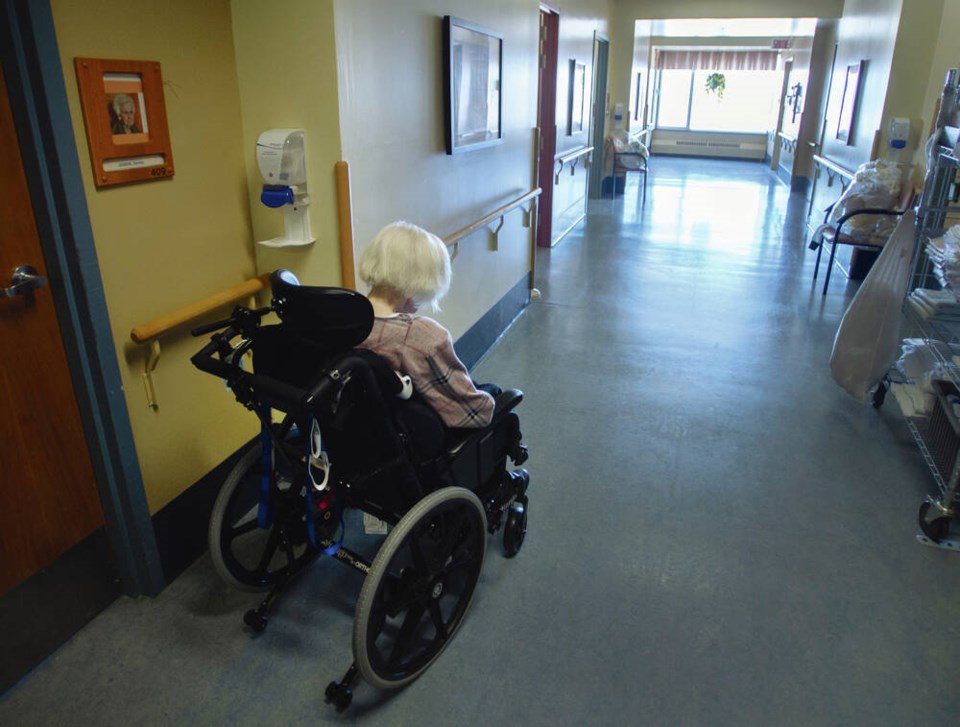In her year-end report on long-term care facilities, Isobel Mackenzie, B.C.’s seniors advocate, revealed some disturbing facts.
Just over 50 per cent of all nursing home residents are being treated with antipsychotics, yet only half as many have been diagnosed with psychosis.
That number is up eight per cent from last year, and residents in facilities operated by health authorities are just as likely to be given antipsychotics as residents in privately owned facilities. We’ll return to this.
Five-year trends show a continuing decline in physical, occupational and recreational therapy. Only one in 10 residents now receives physical therapy, which is clearly inadequate in view of the challenges facing this group.
And in facilities owned by health authorities, only 61 per cent of residents have single occupancy rooms. That’s well below the level in private facilities — 85 per cent.
There is some good news. The number of inappropriate incidents fell year over year. And staffing levels have edged up.
Yet the underlying concern is that our population is rapidly aging. By 2036, one in four Canadians will be 65 or over. If we cannot provide adequate care as things stand, how are we to meet future needs?
Let’s return to the over-prescribing of antipsychotics. The first thing to note is that these drugs can be extremely difficult to tolerate. They often have distressing side-effects such as mental confusion and memory loss.
So how can so many residents be given such drugs without a medical diagnosis to justify it?
There are several possible explanations. During the COVID outbreak, many physicians have been dealing with their patients by phone.
But some LTC residents are too ill to discuss their symptoms with a physician in this manner, or indeed at all. In these cases, the doctor may be relying on the judgment of facility staff who are not qualified to diagnose psychosis.
Even so, overprescribing of antipsychotics in LTC facilities has been going on for years. That can’t be the main reason.
A more likely explanation is that these medications are being used to calm and tranquilize residents. It’s widely believed that “off-label” prescribing, as this practice is known, is used to make up for a shortage of hands-on care.
The question is what can be done. There are some disciplinary steps that could be taken.
Physicians in B.C. require a billing number, given them by the Medical Services Plan. Without this, they cannot be reimbursed for their work.
But while a physician’s billing number can indeed be cancelled, doing so would require extensive proof of misconduct. And here we return to the fundamental problem.
LTCs in B.C. do not always possess the in-house medical supervisory structure, or record-keeping resources, to mount such an action.
One option would be to give the seniors advocate investigatory powers on a par with the auditor general or the children’s representative. Both of the latter are officers of the legislature. The seniors advocate operates under the authority of the health ministry, which gives her less scope.
Whatever solution is chosen, we cannot go on as things are. It is now apparent that thousands of elderly and infirm LTC residents are being mistreated. If the numbers are not precise, it is because the reporting and disciplinary systems are inadequate.
For years, our country’s LTC system has been an orphan child, its residents too often out of sight and out of mind. In days gone by, adult offspring were often the primary centre of support for elderly parents.
But as the population ages, those offspring are often themselves approaching old age. The help they can offer may be limited.
It comes down to this. Nursing homes are rapidly becoming the front-line caregivers for elderly Canadians.
If adequate measures aren’t taken to improve conditions in these facilities, it can only be because no one in authority can find the time to do so.

.jpg;w=120;h=80;mode=crop)


